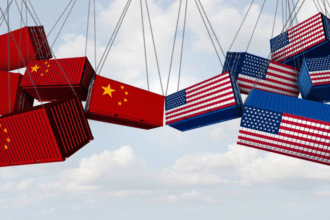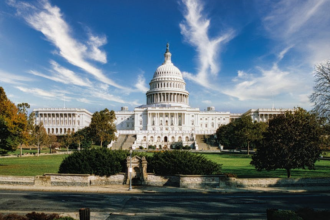In Donald Trump’s White House, personal relationships play a crucial role in shaping diplomatic ties. The dynamics between leaders often influence how their nations are treated, making it essential for British Prime Minister Keir Starmer to establish a rapport with the US president during their discussions on Thursday. Beyond mastering the details of policy discussions, Starmer needed to connect personally with Trump. Their meeting set the tone for US-UK relations moving forward.
A major gesture that set a positive tone for the visit was the invitation from King Charles, which left Trump visibly flattered. The president expressed his appreciation, stating, “And that’s a great honour, because it’s never happened before. I really do call it an honour, but it’s not for me, it’s for our country. It’s respect for our country.”
The historic nature of this state visit further underscored the importance of maintaining strong US-UK relations, with both leaders acknowledging the deep-rooted alliance between their nations. The significance of such a meeting extends beyond diplomatic courtesies—it lays the groundwork for future cooperation on pressing global issues, ranging from security concerns to economic collaboration.
Where Do They Stand on Ukraine?
Despite the diplomatic niceties, fundamental differences emerged on key global issues, particularly regarding Ukraine. Starmer used careful language to praise Trump’s role in creating the conditions for a ceasefire discussion. However, their perspectives on a potential peace deal diverged significantly.
While Trump expressed confidence in Russian President Vladimir Putin’s willingness to adhere to an agreement, Starmer emphasized the importance of ensuring that any truce is durable and does not benefit the aggressor.
One area of alignment was Starmer’s commitment to increasing UK defense spending, which was well received in Washington. However, he failed to secure a concrete US commitment to ongoing security guarantees for Ukraine once a peace deal is finalized, which could impact the future of US-UK relations.
The debate over Ukraine also highlights broader questions about how the Western alliance should handle global conflicts. While Trump’s preference for diplomacy and negotiation aligns with his “America First” approach, Starmer and other European leaders are keen to ensure that any agreement does not embolden future aggressors. This divergence in views may shape how future NATO engagements unfold and whether the US will remain deeply involved in European security efforts
Did Trade Talks Yield Any Breakthroughs?
The leaders first met in the Oval Office just before lunch, and while their initial interactions were friendly, the mood seemed less relaxed after three hours of intense negotiations.
Trump’s remark to Starmer, “You are a very tough negotiator… I’m not sure I like that, but okay,” hinted at the intensity of their discussions. He did not seem entirely joking.
However, there was some progress regarding trade relations. Trump acknowledged Starmer’s efforts, stating, “He’s worked hard and earned whatever they pay him over there,” suggesting that the British prime minister had made a strong case for a trade agreement instead of imposing tariffs on UK exports. While this could be seen as a victory for Britain, any trade deal would require extensive negotiations before becoming a reality, further influencing US-UK relations.
The trade discussions also underscore the challenges Britain faces post-Brexit in securing advantageous trade deals outside the European Union. Starmer is keen to strengthen economic ties with the US, ensuring that British industries do not suffer from additional trade barriers. Trump, known for his transactional approach, has signaled interest in such a deal but remains firm in his stance on prioritizing American interests. Whether the two nations can strike a balance between mutual benefit and domestic priorities remains to be seen.
How Did Their Styles Influence the Meeting?
There had been speculation about how Starmer’s serious and methodical demeanor would mesh with Trump’s bombastic and unconventional style.
Carefully chosen words and diplomatic flattery helped set a constructive tone for the meeting. Starmer praised the close ties between the two countries, stating, “The UK has a true friend in the Oval Office.” He also spoke Trump’s language by highlighting their shared global economic influence, noting that the US and UK were ranked as the top two investment destinations.
Trump responded positively, even making a lighthearted remark about Starmer’s British accent, quipping, “What a beautiful accent. I’d have been president 20 years ago if I had that accent.”
This meeting underscored the evolving nature of US-UK relations and how both leaders are approaching their partnership. The body language and tone throughout the meeting reflected a mix of mutual respect and underlying tensions. While Starmer maintained a formal and professional stance, Trump’s characteristic unpredictability added a layer of uncertainty to the proceedings.
Despite their differences, both leaders recognize the importance of fostering a strong relationship. Starmer’s challenge moving forward will be navigating the complexities of working with a leader known for his shifting positions and unconventional approach to diplomacy.
What’s Next for US-Ukraine Relations?
As Starmer departed, attention turned to Trump’s upcoming meeting with Ukrainian President Volodymyr Zelensky. Just a week after referring to Zelensky as a dictator, Trump appeared to soften his stance. “I think we’re going to have a very good meeting tomorrow morning. We’re going to get along well,” he said, signaling a shift in tone.
Zelensky’s visit to the White House will be another crucial moment in shaping US-Ukraine relations. With Ukraine seeking continued military and economic support, the outcome of this meeting could influence the trajectory of the ongoing conflict. The level of US involvement in Ukraine’s defense strategy remains a contentious issue, with domestic political considerations playing a significant role in shaping Trump’s approach.
While the long-term impact of Starmer’s visit remains to be seen, it is clear that his first encounter with Trump set the stage for a relationship defined by cautious diplomacy and strategic negotiation. US-UK relations will continue to be a key aspect of international diplomacy in the coming months.
Starmer’s ability to balance a strong national stance while maintaining a productive relationship with Trump will determine how effectively the UK can navigate future challenges. Whether in matters of trade, security, or diplomacy, the evolving dynamics between these two leaders will shape the course of global affairs in the years ahead.
As global challenges intensify, the importance of maintaining a solid transatlantic alliance cannot be understated. US-UK relations, rooted in history but ever-changing, will remain at the forefront of international diplomacy, with leaders like Trump and Starmer playing pivotal roles in defining their future trajectory.








